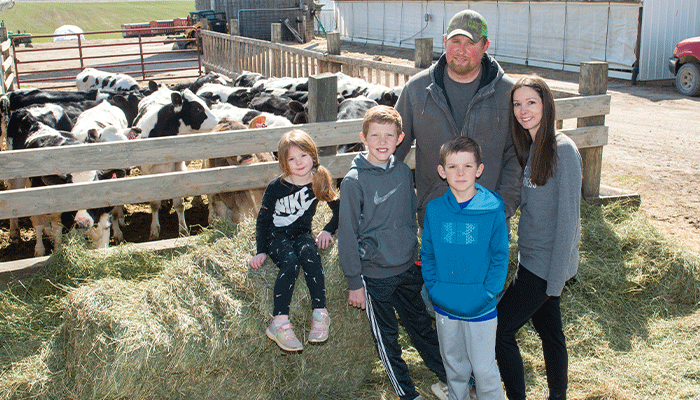Cheese, glorious cheese
Author
Published
5/4/2023
In recent years, lower milk prices and increased production costs have taken their toll on Iowa dairy farmers.
However, the Schultes are making a leap of faith.
Austin and Jenna Schulte, Benton County Farm Bureau members who farm near Norway are looking to add value to their land, cows and milk by building an on-farm creamery and producing home-grown cheese for the local and regional market.
The Schultes will join Iowa’s growing cottage food production industry, capitalizing on their location near the eastern Iowa golden triangle of Cedar Rapids, Iowa City and the Amana Colonies and producing a line of Cheddar and Alpine cheeses.
Investing in the future
It’s no small undertaking. Their $2.4 million project includes a newly equipped modern creamery, cheese aging room and space for an on-farm store.
In May 2022, Schulte Dairy received a Choose Iowa Grant from the Iowa Department of Agriculture and Land Stewardship (IDALS). The grant helps Iowa businesses grow and access new markets for value-added foods, providing a total of $250,000 to 13 recipients last year.
This winter, the Schultes also received a $36,000 Value-Added Producer Grant from the U.S. Department of Agriculture.
The grants have allowed the Schultes to hire an expert consultant, as well as assist with the expense of creating a business plan, conducting a feasibility study, branding and marketing.
They tapped Iowa State University resources, working with dairy scientist and cheese expert Stephanie Clark, and have signed up for Clark's upcoming cheesemaking classes.
For Austin and Jenna, it’s worth the investment of time and resources.
“We get a big quality and taste advantage making the cheese here on the farm,” says Austin. “The milk is single source, with no comingling with other milk. Handling is reduced with no trucking. The milk will be pumped less than 150 feet from the milking parlor to the creamery. ”
To start, one-third to one-half of the milk produced on the farm will be used for cheese, with any extra shipped to Wapsie Valley Creamery in Independence.
The dairy is also in the process of genomic testing for cows that produce A2/A2 milk, a class of milk that is more easily digested for people who are lactose intolerant and is associated with higher cheese yields.
The plan includes continuing the cows’ diet of local corn, soybeans, hay and forages.
Like all milk produced for human consumption, milk used in cheese making is antibiotic free. The milk is also pasteurized and tested to ensure food safety.
Producing their own cheese adds another benefit to the operation. Whey from the cheese can be fed back to the cows, reducing food waste.
“It’s one of the ways we can remain sustainable and stay on the farm,” says Jenna.
Because for the Schulte family, it’s about more than cheese. “This is our history. This is our home,” says Jenna.“This is our kids’ future.”
The farm story
Austin grew up on the farm and dairy, started by his grandfather. Austin and Jenna took the reins from Austin's parents around 12 years ago. They have four children, aged 5 months to 12 years.
Educating the public is part of their mission, and the kids love giving tours to their friends. Jenna wants the farm tours to continue once the cheesemaking is in full force.
“It’s good for people to learn where their food comes from,” she says. “We can show them what it’s like.”
They plan to sell through local shops, wineries and farmers markets, as well as their own store and direct sales, completing the local circle.
“In a way, it’s going back to the way things were 100 years ago,” says Jenna. “In a good way.”
And it provides a path for the next generation. “This provides a way for our kids to stay on the farm,” says Jenna. “This farm is their passion. This will help keep their dreams sustainable.”
The art of cheese
Northeast Iowa's Schulte Dairy will start their on-farm cheesemaking venture with cheddar.
The popular hard cheese can be aged in varying ways, creating different finishes and textures. The aging process can take from three to six months for mild varieties, and up 10 years or more for maximum sharpness.
Cheddaring, the process of making cheddar cheese, begins with traditional cheesemaking techniques.
Cultures and rennet are added to fresh milk, causing it to acidify and curdle. Once the curds form, they are cut and allowed to settle into slabs that are stacked and repeatedly flipped, compressing the curds and squeezing out the whey. The slabs are then cut into squeaky cheese curds, which are pressed into blocks. After aging, the result is a dry and crumbly cheese.
Schulte Dairy will also feature Alpine cheeses, like Jarlsberg. The specialty cheese originated in Jarlsberg, Norway. Austin and Jenna chose it for the connection to their hometown, Norway, Iowa. It’s a holey, sweet and nutty Swiss-style cheese. Jarlsberg is one of the most imported cheeses in the U.S.
The Schultes also plan to sell fresh curds in addition to the aged cheeses, and quark, a soft cream cheese-like cheese. It’s an exciting venture into a growing artisan food market — and a way to keep the family dairy in today’s game.
“We’ll be able to bring something different to the table,” says Jenna, “and stay on the farm.” Schulte Dairy hopes to have cheese available to consumers by next year through on-farm sales and local retail stores.

Photo above: Austin and Jenna Schulte and family. Photo by Conrad Schmidt.
Queck-Matzie is a freelance writer from Greenfield.
Want more news on this topic? Farm Bureau members may subscribe for a free email news service, featuring the farm and rural topics that interest them most!